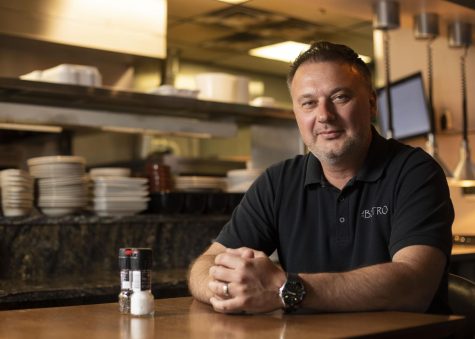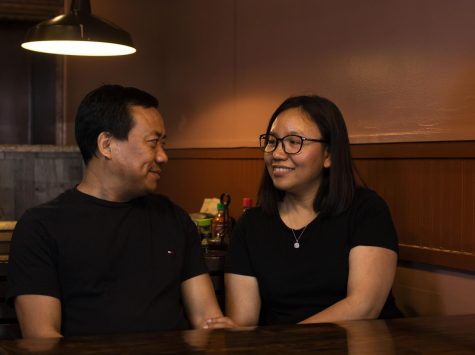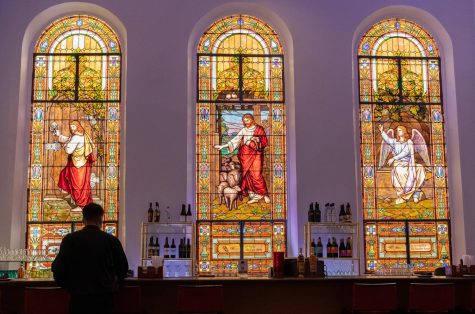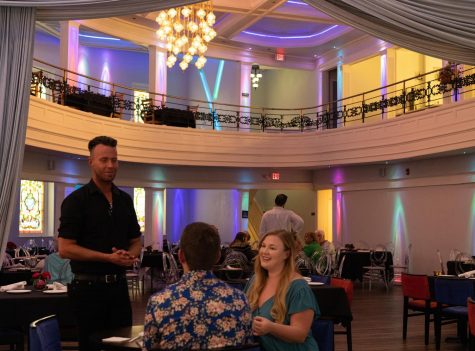Immigrant-owned restaurants provide international flavors
Dishes at K&L Asian Restaurant reflect the Vietnamese culture by bringing flavors from that region of the world to the United States. Seen are a Vegan Pho, which is typically a dish served with beef, and Bun, or Vermicelli Noodle with chicken, which is typically made with pork. The owners of K&L wanted to treat customers to the best of both cultures.
May 15, 2023
Thousands of refugees have found their home in Bowling Green over the past three decades, changing the landscape. The city has come to reflect the abundance of cultural cuisine that hail from the homelands of the many immigrants who now live here.
Bowling Green residents can find an array of dishes from different ethnic backgrounds. Mexican cuisine was one of the first to grow in popularity in the city from the 1990s to early 2000s. During this time period, Italian and Chinese restaurants were also becoming numerous. Since then, Bowling Green’s food diversity has grown to include Bosnian, Chinese, Greek, Indian, Italian, Japanese, Mexican, Thai, and Vietnamese cuisines.
Vilson Qehaja and Anna Qehaja are the creative minds behind Anna’s Greek Restaurant, a staple Mediterranean restaurant in the city. Myanmar refugees Thang Khap and Lian Vung own a small but distinct restaurant that offers a broad taste of Asian cuisines. Sasa Mandrapa, from Bosnia and Herzegovina, has been setting high standards for the food scene in Bowling Green since 2006 when he opened his first of six restaurants. The powerful stories and unique contributions of these refugees have made Bowling Green the city we know today.
SAŠA MANDRAPA
Since the early 1990s, Bowling Green has become home to almost 5,000 Bosnian refugees, many of whom were fleeing war and ethnic cleansing.
These refugees brought with them culture and creativity, which made Bowling Green what it is today.
Shortly after the war in Bosnia and Herzegovina ended in 1995, Saša Mandrapa came to Bowling Green as a refugee.
Mandrapa, who was only 17 at the time, was sponsored to come to America by his uncle who came in 1994.
“I always wanted to come to America, so this was the perfect opportunity for me to,” Saša said. “For the future of me and other people, this was the only chance.”
Being a young boy when the war broke out, Mandrapa said he tried not to take the war too seriously, even though it was scary at times. He said he tried to have fun through the hard times.
“As a kid you don’t think about certain things,” Mandrapa said. “When certain things strike, then reality check comes in.”

Saša said he is fortunate to have survived such a hard period in his life.
“A lot of people lost their homes,” Mandrapa said. “A lot of people went through different experiences through that. A lot of people didn’t make it, too, so I was fortunate enough.”
Mandrapa said some of his experiences you would need to live through to understand.
“I mean no water, no electricity, no internet, no roof over your head in certain parts,” Mandrapa said. “Being a kid, you try to make the best out of it, but a lot of people died, too, so it’s not fun.”
Coming from a small town in Bosnia-Herzegovina, Mandrapa said arriving in America was dreamlike.
“When you come from a different part of the world, where food is scarce, simple things as swiss rolls, donuts and chips go a long way,” Mandrapa said. “America was like a movie – la la land, Disneyland.”
Mandrapa said the first challenge he encountered when he came to Bowling Green was the language barrier. Although he learned English when he was in school, he said speaking and putting long sentences together could be challenging.
After graduating from Bowling Green High School in 1997, Mandrapa got a job at a local company to start earning his own money.
Throughout his life, Mandrapa had always taken an interest in cooking.
“I always liked to cook,” Mandrapa said. “I have brother and sister younger than me, so they always wanted to eat what I eat.”
When one of his friends opened Brickyard Cafe, he started working his first restaurant job as a dishwasher.
When he wasn’t doing dishes, he was working at different stations learning how to make meals. He worked there from 1999 to 2003.
Although Mandrapa never went to culinary school, he became skillful in the kitchen by working with different chefs. He said it became his hobby and passion.
When his wife wanted to go to chiropractic college in St. Louis, they moved there for three years. Mandrapa worked at a few different restaurants while living in St. Louis.
When he returned to Bowling Green in 2006, Mandrapa found himself with an opportunity to open a restaurant.
Debating between working in a restaurant setting, or taking a job at a local food distribution company, Mandrapa ultimately ended up accepting an offer to become a partner at a new restaurant.
In partnership with two of his friends, Mandrapa opened his first restaurant: The Bistro.
Mandrapa describes The Bistro as a higher end dining option that had an extensive Mediterranean menu when it first opened.
It was important to Mandrapa that The Bistro was located in a downtown location to fit the atmosphere of the restaurant.
“I knew I wanted to be in a downtown area because of the concept of the restaurant,” Mandrapa said. “We belonged there, and us moving over there and getting the building where we are now is the best decision we ever did.”
Mandrapa said that without the success of The Bistro, he doesn’t know if any of his other restaurants would have ever happened.
“It was definitely an intro into the rest of the concepts that we have,” he said.
With his partner Jake Petrivich, Mandrapa has gone on to create his own restaurant empire with a total of six restaurants: The Bistro, Novo Dolce, Pub by Novo, Burger and Bowl, Toro, and his newest, Speeza.
All of his restaurants have a different style and creative flourish.
Novo Dolce is what Mandrapa describes as a gastro pub with different classics executed using better techniques. Pub by Novo is Mandrapa’s version of a sports bar. Burger and Bowl serves gourmet burgers and healthier, fresher bowl options. Toro is a Spanish fusion of cuisines from Spain, Argentina, Peru, and Mexico.
Speeza is Mandrapa’s newest creative venture, set to open in April or May of 2023. Saša said this restaurant will specialize in Mediterranean street style food.
“I think it’s going to be something new for Bowling Green,” Mandrapa said. “So that’s something to come. I can’t wait for the Bowling Green people to try.”
Mandrapa prioritizes diversity and creativity when designing his restaurants and creating unique dishes.
“I like to be creative,” he said. “They say consistency is key, but at the same time consistency kills creativity.”
The Bowling Green community has reacted positively to the restaurants, Mandrapa said.
“People like diversity,” Mandrapa said. “They like creativity, and that’s the one thing I think we bring. Bringing different things to Bowling Green is good, and I think that people love that.”
The Bowling Green Area Chamber of Commerce recently named Mandrapa as the 2023 Small Business Person of the Year. This award recognized his work ethic and the impact his businesses have made on the labor force in the area.
To this day, Mandrapa is continuing to challenge himself and learn new skills in the kitchen.
“You’re as good as your last dish,” Mandrapa said. “You’re as good as your last plate.”
K&L ASIAN RESTAURANT OFFERS THE CITY A DIVERSE ASIAN MENU
(Cing Dim, server at K&L, translated for Khap and Vung)
One of Bowling Green’s largest refugee populations is made up of people from Myanmar, a Southeast Asian country formerly known as Burma.
From 2017 to 2021, 442 Burmese refugees arrived in Bowling Green, according to the Kentucky Office for Refugees.
Many Burmese refugees left their country due to ethnic persecution, civil war and widespread poverty.
Cing Dim, an immigrant from Myanmar, sought refuge in Malaysia before coming to America when she was 10 years old. Before coming to Bowling Green in 2021, she lived in Michigan for 10 years.

“We would go from underground to Malaysia, so it was a little difficult with that because I was underage and I had to travel,” Dim said. “When we get to Malaysia we stayed there for two years, and I would go to a school for two years and switch schools a lot because we’re immigrants, so we cannot just stay in one place.”
Dim became connected to Thang Khap and Lian Vung through family friends as well as the Zomi Agape Church in Bowling Green.
Thang Khap and his wife, Lian Vung, are immigrants from Myanmar who eventually found refuge in Bowling Green in 2011.
Khap and Vung lived in Malaysia for many years before coming to America.
Like most refugees, the couple brought their culture and memories of home with them.
In Malaysia, Khap worked as a chef for eight years, and he always wanted to have his own restaurant.
“Opening a restaurant was always one of his dreams,” Dim said.
After living in Bowling Green for a couple of years, Khap and Vung were able to open K&L Asian Restaurant together on Aug. 6, 2019. Dim now works as a server at the restaurant.
When Khap and Vung were looking for a restaurant in Bowling Green, they wanted a location that was previously a restaurant. They were able to find a location on Scottsville Road that had previously served Vietnamese pho.
The name of the restaurant is inspired by the owners’ names: Khap and Vung.
The restaurant offers Bowling Green a diverse Asian Menu that includes popular Vietnamese, Thai, Japanese, Malaysian and Burmese cuisines.
When creating a menu for the restaurant Khap wanted to pick popular foods from different countries to add a variety of taste and style to the restaurant.
Dim said that the people who visit the restaurant are always open minded about trying new food and tend to find that the style of food is exactly what they’ve been looking for.
“If they’ve never been here before, they already have an open mind that it’s going to be spicy, it’s going to be sour,” Dim said. “They already have that open mindset, so it’s not difficult for us to introduce.”
When people in America say they like his food, Khap gets a feeling of inner peace, Dim said.
Dim’s favorite Asian food is anything that is fried or has fried rice with it. Khap favors pho because it’s good for his health, and Vung loves Burmese kyay oh, a noodle soup made with pork and egg.
Dim said that the restaurant has helped the family support themselves financially, and the people of Bowling Green have been very happy with the restaurant.
When Khap and Vung arrived in Bowling Green, the language barrier they experienced made it hard to find employment. Owning their own restaurant made this challenge easier.
K&L is a family-run restaurant, so the majority of the workers are related or family friends. Servers like Dim help with the language barrier between the staff and customers.
Khap and Vung became more comfortable in Bowling Green after opening the restaurant.
“After opening this restaurant they are more confident in themselves,” Dim said.
Life in America is very different from Burma, Dim said. In order to eat in Burma, you have to work every single day.
Dim said the military coup in Burma made life very hard, and she came to America looking for a better life. She said Khap and Vung wanted their family and children to be safe.
“The main reason is your children,” Dim said. “They want them to have a better life. They don’t want them to suffer how they are, even though they’re scared.”
Dim said when they arrived here they were supported by the International Center of Kentucky.
“When we first go here they would provide food, clothes, shelter, and finding us a job,” Dim said. “They would take care of us for like six months. After that they kind of let you do it on your own.”
America isn’t exactly what she expected it to be, Dim said.
When she pictured America, Dim imagined a country composed of tall buildings and big cities, but that’s not exactly what she found here when she arrived.
“Our life is so hard in Burma, we think America is like a heaven,” Dim said. “It’s our escape place. But when we first came here, it’s not a lot of tall buildings. It’s not peaceful as what we think it is. We do have to struggle with language barrier and finding a job. It’s not what we thought it would be, but it’s definitely a better place than Burma.”
In spite of the challenges, Dim said that she is grateful for the life she has in America.
Dim said that the people of Bowling Green have been very kind to the workers of the restaurant and they are glad to serve a diverse group of people in Bowling Green.
“Our restaurant is Asian food, so we thought a lot of Asian people were gonna come and it seems like the only customer we’re going to have is Asian people, but it’s not,” Dim said. “We have a lot of American people and a lot of other people too.”
Dim encourages people who are interested in trying different types of Asian food to come visit the restaurant and try something new.
THE MAN BEHIND ANNA’S GREEK RESTAURANT
Vilson Qehaja- A refugee from Kosovo turned a run down church into a renowned restaurant.
In Kosovo in 1999, a young Vilson Qehaja was presented with an opportunity that would alter the course of his life.
The 19-year-old college student was given the chance to emigrate to America with his family. It was a chance to leave a war-stricken Kosovo behind and begin a journey in which he would learn how to live in America.
Unknown to him at the time, Qehaja would eventually become the owner of one of the most renowned restaurants in Bowling Green: Anna’s Greek Restaurant.
After receiving guidance and support from the Bowling Green community shortly after they arrived, Qehaja and his father opened an information technology business called Q Electronics. It was his first business in America, but not his last.

Over the years, Qehaja has owned an interior design business, construction company, limousine service and the restaurant inspired by his wife.
Qehaja met Anna on a vacation in Santorini Island during the summer of 2004. On his ninth day there, he found himself in Anna’s restaurant.
“I asked her out, and I got turned down three times,” Qehaja said. “The rest is history.”
Growing up, Anna learned to cook by helping her grandmother, and other women in her family, prepare meals.
“From an early age she developed an interest in cooking,” Qehaja said. “She started her first job as an assistant for a Greek chef in a small restaurant in Santorini Island. After so many job experiences, she ended up owning her own restaurant in Kamari. That’s where I met her.”
Anna eventually immigrated to Bowling Green to be with Qehaja. They now have four children and have remained living and working in Bowling Green for nearly two decades.
Qehaja knew Anna had a talent for cooking that deserved to be in a proper restaurant setting in Bowling Green.
“I met my wife, and I loved her food,” Qehaja said. “I didn’t want her to flip burgers here.”
With financial support from past patrons and other contributors, Qehaja was able to open Anna’s first restaurant on Three Springs Road in 2007. After the highway department widened the road, taking the restaurant’s parking, they relocated to Glasgow for four years.
With most of the restaurant’s customers remaining in Bowling Green, Qehaja was always keeping an eye out for prospective buildings here.
The building that caught his eye was one that 19-year-old Qehaja had become familiar with.
Across the street from Christ Episcopal Church, which had supported him in his first days in America, sat Victory Baptist Church, a building that was over 100 years old.
The Greco-Roman style of the building reminded Qehaja of the domed roofs and columned buildings in his wife’s hometown of Santorini.
Qehaja was drawn to the beautiful stained glass inside the church, despite that it was in need of much repair.

Although he loved the building, he knew he didn’t have the money to buy it.
Nevertheless, on Aug. 25, 2015, Qehaja showed up to the auction for the church and started the bid at a low price.
The building was his by the end of the day.
“It looked very beautiful,” Qehaja said. “It looked authentic, you know something that is hard to recreate today. I never thought I would ever own a place like this and have my name attached to it as a legacy.”
Qehaja said God has always had a presence in his life.
“I know God guided me, and I know God had a plan for me because there were a couple moments in my life during the war that I thought that this was the end,” Qehaja said.
While his parents are Muslim, Qehaja converted to Christianity and has led over 150 members of his extended family to Christianity.
Qehaja said he explored different denominations including Evangelical, Episcopalian and Baptist.
After purchasing the church, Qehaja said he now preaches the gospel and reads from the Bible inside of the restaurant.
“I talk to people all the time about God,” Qehaja said. “How God saved me in the war, and how God gave me everything I have today.”
Qehaja attributes the chance to come to America and the success he has had with his businesses to the plan that God had for him.
“I know this saying I’ve learned here in the United States that when humans make plans, God laughs,” Qehaja said.
Although Qehaja was able to purchase the church, the shape of the building introduced a new challenge for him.
“The building needed a lot of repair,” Qehaja said. “There was a lot of damage, water damage in every area. You could be here and something would just fall from the ceiling. It was in very bad shape.”
Repairing the stained glass was very important to Qehaja in order
to maintain the original quality and glory of the building. Individual stained glass panels were taken apart to replace broken pieces. The glass was reframed and installed into new wooden frames. The process of repairing the glass took over three years to complete.
Qehaja and his father Esat have been recognized for their preservation efforts on the church that took place over a five year period. By repairing the building himself, Qehaja earned a sense of pride in the building and became attached to its history and preservation.
“If you don’t have millions of dollars to hire other people to do it, you buy the material, and you work yourself,” Qehaja said. “If you don’t know, you learn it.”
“People still care and pay attention to unique projects and the work to restore buildings,” Qehaja said. “It requires a lot of skill, research, and dedication.”
The restaurant officially opened at the new location in 2019, and the response by customers was positive, Qehaja said.
The combination of both Qehaja and Anna’s cultural backgrounds have designed a diverse Mediterranean menu that includes Greek, Italian, German, French and Turkish entrees.
Qehaja describes the food served as being fresh, flavorful and authentic.
Once customers eat Anna’s food once, they are guaranteed to be craving it in the future, Qehaja said.
The restaurant has been recognized by customers for its great tasting food and unique fine dining atmosphere in Bowling Green.
For Qehaja, the main goal for the restaurant has always been to create a “family atmosphere” among employees and customers.

Qehaja recognized the efforts of the community and his personal connections with people in making the restaurant possible.
He recalled a specific connection with Portia Wimp, a member of Christ Episcopal Church, who had helped organize to support him and his family.
When Wimp had first heard of Qehaja, she was told he was a young man who had come to the church looking for Christians.
Wimp and church volunteers came together to find supplies and donations to give to the family.
“The church helped as much as we could,” Portia Wimp said. “We just met them as people, and just tried to give them the things we thought they needed.”
After the church showed their new neighbors such humanity, the Qehaja family invited Wimp and her family over for dinner.
“His parents were so lovely, we managed to communicate with them even though they did not know English,” Wimp said. “It is amazing how people can communicate through smiles.”
Qehaja recalled Wimp making a comment during dinner that she could see a restaurant coming in the future.
“That’s one of the things that Jesus taught us, to love our neighbors,” Wimp said. “And our neighbors are all over the place.”
News reporter Madison Carter can be reached at madison.carter312@ topper.wku.edu.



















